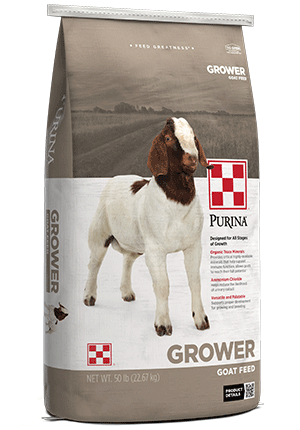Purina® Goat Grower 16 Plus Up DQ.0015
Complete feed for the growth and development of goats
Purina® Goat Grower 16 Plus Up DQ.0015 is a pelleted complete feed formulated for the optimum growth and development of goats. Whether you raise meat goats or dairy goats, Purina® Goat Grower 16 Plus Up DQ.0015 feed is designed to meet their exacting needs.Purina® products deliver the nutrition and performance you expect. Try Purina® Goat Grower 16 Plus Up DQ.0015 feed and see the difference it can make in your goats’ overall growth and health.
-
See Full Details
NUTRITIONAL INFORMATION
When it comes to nourishing and nurturing your animals, quality matters. That’s why Purina’s high-quality, research-proven products are formulated for optimal nutrition with the best ingredients that meet our stringent quality and nutritional standards.

-
Guaranteed Analysis
Nutrient Min/Max Amount Crude Protein MIN 16.00 % Non Protein Nitrogen (NPN) MAX 1.50 % Crude Fat MIN 2.00 % Crude Fiber MAX 16.00 % Acid Detergent Fiber (ADF) MAX 20.00 % Calcium (Ca) MIN 1.00 % Calcium (Ca) MAX 1.50 % Phosphorus (P) MIN 0.50 % Salt (NaCl) MIN 0.50 % Salt (NaCl) MAX 1.00 % Sodium (Na) MAX 0.65 % Copper (Cu) MIN 20.00 PPM Copper (Cu) MAX 27.60 PPM Selenium (Se) MIN 0.30 PPM Vitamin A MIN 5,000 IU/LB -
Ingredients
- ACTIVE DRUG INGREDIENTS
Decoquinate..........................0.0015 % (6.8 mg/lb)
Wheat Middlings; Wheat Red Dog; Ground Soybean Hulls; Corn Distillers Dried Grains with Solubles; Cane Molasses; Calcium Carbonate; Dehydrated Alfalfa Meal; Dehulled Soybean Meal; Ground Corn; Ammonium Chloride; Salt; Yeast Culture; Colored with Iron Oxide; Vitamin A Supplement; Zinc Amino Acid Complex; Manganese Amino Acid Complex; Copper Amino Acid Complex; Vitamin D3 Supplement; Cobalt Glucoheptonate; Vitamin E Supplement; Zinc Oxide; Cobalt Carbonate; Manganese Sulfate; Ethylenediamine Dihydroiodide; Zinc Sulfate; Sodium Selenite; Basic Copper Chloride.
*Ingredients differ by manufacturing plant.
- ACTIVE DRUG INGREDIENTS
-
Feeding Directions
Best Results
Feed at a rate of 1.67 lbs to goats/kid weighing 50 lbs to provide 22.7 mg decoquinate per 100 lb of bodyweight (0.5 mg/kg) per day. Feed at least 28 days during period of exposure to coccidiosis or when it is likely to be a hazard. Warning: Do not feed to goats producing milk for food.
Caution
Store in a dry, well-ventilated area protected from rodents and insects. Do not feed moldy or insect-infested feed to animals as it may cause illness, performance loss or death.
This product contains copper and should not be fed to sheep. Bentonite should not be used in decoquinate feeds.
USE ONLY AS DIRECTED.Important
1. Start kids on colostrum milk from birth to 3 days of age; feed Land O’Lakes® Doe’s Match® Kid Milk Replacer or Purina® Goat Kid Milk Replacer from 2 days until 4-8 weeks of age.
2. If kids have not been creep fed or they were purchased, then they should be placed on grass hay on a free-choice basis after arrival.
3. When making a ration change, allow 7 to 10 days for animals to adjust to the new ration.
4. Keep a constant supply of complete feed available. Do not let fine material accumulate in feeders.
5. Provide adequate bunk space for each animal. Bunks should be well-protected and well-managed to prevent feed from becoming wet or moldy.
6. Provide a source of fresh, clean water at all times.
7. Feed Purina® Goat Mineral free-choice.
8. Consult your veterinarian for the recommended health program for your local area. This includes internal and external parasite control. In groups of goats there are certain animals that experience chronic bloat, or other digestive disturbances and consequently, are poor performers. In addition, excess feed consumption, severe weather changes resulting in erratic feed consumption and poorly managed feeding practices, can increase the incidence of bloat in all goats. If bloating occurs, the above management practices should be reviewed and your veterinarian consulted.
-
Guaranteed Analysis
-
Learn More
CONTINUOUSLY INNOVATING ANIMAL NUTRITION
Purina is relentlessly seeking the next innovation in animal nutrition and targets relevant issues facing animal owners to help enhance their animal raising experience.
CONTINUOUSLY INNOVATING ANIMAL NUTRITION
Purina is relentlessly seeking the next innovation in animal nutrition and targets relevant issues facing animal owners to help enhance their animal raising experience. We’ve conducted over 24,000 animal nutrition studies and counting to find impactful, accessible solutions for animals and their owners.
Our research is performed in fields across the country and on our 1,200-acre working farm in Gray Summit, MO, the Purina Animal Nutrition Center, where we care first-hand for over 3,000 animals, every single day, ensuring our outputs of research, knowledge, and product innovation work properly for the real-life needs of animals.
Driven By Science
& Our Love of Animals
Purina understands and cares about the unique needs of your animals and the importance of bettering their well-being, performance and health. For more than 125 years, we have been tackling the biggest nutrition challenges using science, and our love of animals pushes us until we get it right. Our team is made up of more than 500 Masters of Sciences, Ph.Ds., veterinarians, nutritionists, microbiologists, geneticists, and immunologists, all who share a passion for providing animals with the best nutrition for the best results.

.png?width=72&height=72&ext=.png)

Purina understands and cares about the unique needs of your animals and the importance of bettering their well-being, performance and health. For more than 125 years, we have been tackling the biggest nutrition challenges using science, and our love of animals pushes us until we get it right. Our team is made up of more than 500 Masters of Sciences, Ph.Ds., veterinarians, nutritionists, microbiologists, geneticists, and immunologists, all who share a passion for providing animals with the best nutrition for the best results.













